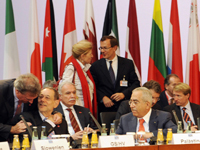Registration
You will receive an email confirming your registration.
IMGXYZ1068IMGZYXEuropean priorities for Middle East policy include greater engagement with the Arab-Israeli peace process and with Iran. The advent of a new U.S. administration and greater diplomatic engagement by Arab states offer the hope of new approaches and possibilities for cooperation.
Andreas Michaelis stressed the importance of taking advantage of the opportunities presented by the transition of government in the United States and upcoming electoral transitions in Israel, Lebanon, and Iran. He identified three trends today in the Middle East: an unprecedented strong connection among conflicts in the region, richer diplomatic involvement by Arab actors in solving these conflicts, and an increased focus on Iran as a regional player. Europe perceives two developments in the Middle East as positive: the reappearance of Syria on the agenda and the successful development of new security structures by the Palestinian Authority.
From a European point of view, the Annapolis process has not been a failure. Instead, it produced a valuable point of reference against tendencies to engage in conflict between the Palestinians and the Israelis. Ambassador Michaelis warned that time for a two state solution is running out for Israel due to its continued settlement activity. In addressing the Palestinian-Israeli conflict, five steps need to be taken: enabling Palestinians to run and own their economy, stopping the spread of settlements, reconciling Palestinian factions, involving Arab partners in peace negotiations, and contribution by outside actors to a peace settlement.
Ambassador Alan Goulty argued two steps need to be developed in order to construct successful policies: developing committed diplomatic presence in areas of conflict and involving directly affected parties in collective policy making. Talks with Iran should be initiated on all levels and not only in reference to Iran’s nuclear program. The conflict in Sudan remains a crucial one to address. Ambassador Goulty drew several lessons from his experiences in Sudan regarding how to construct and manage a successful negotiating process regarding the Israeli-Palestinian conflict. He also suggested that outside actors can help in developing a framework for action on issues such as humanitarian needs in Gaza.
In the question and answer session the speakers further addressed possible areas of cooperation between the United States and Europe in their policies in the Middle East. The Quartet remains a venue used for initiating talks and stabilizing conflicts, but is not a steering board for negotiations. Yemen’s stability needs to be added to the list of priorities in the Middle East and should be addressed in talks with Saudi Arabia and other Gulf states.
